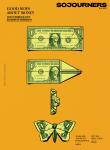EVERY MONTH, TERRY KELLY sends a “rent” check to the Duwamish Tribe on behalf of Quest Church in Seattle, where Kelly serves as senior director of finance.
The church owns the property where it holds services. But the congregation’s monthly payment acknowledges and honors the Duwamish people and other original inhabitants of the land the church occupies, people who have never been “justly compensated for their land, resources, and livelihood,” as the Duwamish “real rent” program puts it.
Members of Quest Church are among the many people of faith who are reimagining the narrative of money in our world today.
The early Christian church was clear in its teachings that money was intended to be used for the benefit of the broader community, not for individual enrichment. But for centuries, and particularly since the Protestant Reformation, the institutional church has more often contributed to ideologies and illusions that reinforce the American form of hypercapitalism. And while money remains a highly visible reality in our everyday existence, our lived stories around money often go uninterrogated.
In America, our views about money tend to be very individualized. We ask questions such as: How is my money going to work for me? Will I have enough to pay bills or retire comfortably? What is my purchasing power? Even the story churches tell is often limited in scope, reduced to teaching about tithes, offerings, building funds, and missions giving. In some instances, we might see positive moves around personal budgeting and reducing debt. But church conversations about money are often left in the realm of personal finance.
Left out of the conversation is how larger systems can be oppressive — especially to the most vulnerable. Left out is the person who budgets well, holds three jobs, yet is still barely making it above the poverty line. Further left out is how the story of money permeates every facet of society across social, political, and spiritual dimensions, down to our individual and collective consumer habits. Or even how money can tap into our deepest aspirations in the pursuit of purpose in this world.
“Money is our most unconscious agreement,” said Orland Bishop, co-creator of Jubilee Gift, an organization that seeks to “reimagine money and protect the sacred.” If this is true, can we awaken to how the story of money can possibly become more? Can money, in its multiple forms, serve as a gift in God’s economy of generosity rather than a commodity that leads to inequity, anxiety, grasping, and greed?
An ecosystem of ‘enough for all’
ALEXIE TORRES, EXECUTIVE DIRECTOR and co-creator of Jubilee Gift, lives these questions daily. Torres is Afro Indigenous and of Puerto Rican descent. She says the impetus behind her work at Jubilee Gift, in the words of its mission statement, is “connecting love and money to God’s gift-giving economy.” The statement continues: “Unless we ‘practice’ at love, to see beyond this mindset and culture, and then translate that from the personal to the institutional and systemic — we are likely to cause more of the same. We are called to an infinite loop of practice — sharing the Gifts of our unique destinies, and softening around money in ways that make it easier for others to give their Gifts too.”
Torres said her abuelo provided an early example of gift giving. “My grandmother used to feed [my grandfather] his plate of food, and it was all there was,” Torres said. “My grandfather would eat around the edges and leave the center untouched. When asked why he would do that, he said that if somebody comes to the door hungry, he wanted to be able to give them food that hadn’t touched his mouth.” That’s the generosity that so often seems to arise from people who are poor: Donde comen dos, comen cuatros [“Where two eat, four will eat”].
This reflects the essence of biblical gleaning laws. According to the Hebrew Bible, the edges of people’s fields were not to be harvested but left for people in need. In Yahweh’s wisdom, loving one’s neighbors would create an ecosystem where there was enough for all.
Torres’ ministry has brought her from grassroots environmental justice work in the South Bronx to engaging the story of money from the side of philanthropy. Torres described how part of our blindness to the story of money comes from being caught up in its illusion — which raises questions around who created this illusion, and who benefits from it. What has been lost along the way is the munificence of God, or what Richard Rohr refers to as “the eternal pattern of generosity” — how God created the world as the ultimate act of generosity and how creation exists within the cycle of continued generosity.
The question of “whose illusion?” arose for me when Torres paraphrased Sonya Renee Taylor saying, “We’ve been living in the imaginations [of rich white men] for most of history.” Today, we see men with obscene amounts of money building spacecraft and embarking on “thrill excursions.” Capitalism and its ethic of “rugged individualism” reinforce the illusion of scarcity and justify the extraction of maximum profits at the expense of the labor force, land, and resources — an ethic reinforced in business schools all over the world. Hypercapitalism tells a cohesive, compelling story in its approach to money and power as ultimate forces in our world. Meanwhile, people disagree on many things, but the story of money isn’t often one of them.
Israel historian Yuval Noah Harari said, “Money, in fact, is the most successful story ever invented and told by humans because it is the only story everybody believes ... Not everybody believes in God, not everybody believes in human rights, not everybody believes in nationalism, but everybody believes in money.”
How do we bring the story of money to the forefront of our collective consciousness?
Even the simple question “How much is enough?” can be provocative. Much of our society sees amassing wealth as virtuous, signifying that a person must have worked hard and done something right to earn such a position. An economics of meritocracy can negate faith in God’s gift-giving economy, where provisions flow from God’s generosity through creation, people, and just economic systems — all working in tandem.
‘This is communion!’
TORRES HAS A deep, sacramental view of how this generosity works as part of her formation in the Catholic tradition. She speaks of the interplay between illusion and mystery. Illusions created by money cause us to settle for a lesser story with outward signs such as status, wealth, and power. Illusion can breed wishful thinking. Illusion has the power to influence and compel giving patterns, the distribution of resources, the over-extraction of land, and the exploitation of human bodies for labor.
When I traveled to Europe earlier this year, I heard many stories told with pride about the wondrous ancient castles built by early European ingenuity under the Romans and Normans. However, the meaning of these castles goes beyond the story of ingenuity or splendor. These were symbols of conquests, reinforced by the church. Eventually, this story of land grabs by kings, barons, and lords made its way to Africa; they created a story about race to justify their greed and land annexations. The pursuit of money by powerful people is performed through stories of justification.
In contrast, to see God’s generosity through the living creation performs another story. According to Torres, “[God’s generosity] is that constant-eternal. It’s mutual, like outpouring and giving, like giving yourself away, coming back, giving yourself away, coming back. It’s that eternal pattern.”
For Torres, that mutuality sparked an insight: “It was that moment where I really could see: Oh, this is communion! This is what the rain says when it hits the earth: Take, eat! This is my body. I give it for you. And this is what the earth says when it takes that and converts it into energy, which turns into food for us. The earth says, “This is my body. I give it for you.” Torres added, “We lost our connection, our deep connection to earth. We lost the ability to see that, to see the first revelation.”
For centuries, humans have been far from this story as we have treated the earth as something to extract from, to control and commodify. Unlike our Indigenous siblings, we live in a world disconnected from the original patterns of generosity, mutuality, and participation. The holiness of land, labor, and stewardship, of what one “owns,” has been reduced to a profane path where the wealthy only grow wealthier, a far cry from participation in God’s ecosystem of generosity.
Reframing the story
IN A PODCAST episode titled “Why Money is a Quasi-Sacrament,” Marc Barnes and Jacob Imam discuss how money is “the visible sign of an invisible power. It denotes the limits of a community. It is the lifeblood of a nation. It connects the citizen with the sovereign. Money serves a similar formative role in the nation as the Eucharist does in the church.”
Perhaps this was why Jesus asked his disciples, “Whose face is on this coin?” The answer was the face of Caesar the conqueror, given over to ruling the nations, overtaxing its exiled subjects, creating misery for those on the margins. But would Caesar’s story of money get the final say on the economic practices of the early church? The first church of Acts was a sign of a new Christ order enacting a radical new performance — namely, practicing a different form of economics to ensure that everyone had enough. A church’s performance is merely the extension of the bountiful table Christ has already set for God’s children — all of them.
As we the church contemplate bread and wine at the table, we can begin to reflect on practices that will challenge hypercapitalism and its story of extraction, exploitation, and exclusion.
Can we decouple the story of money from hypercapitalism? I don’t think so. But perhaps both individuals and institutions of faith can become more creative with their relationship to money; the church can tell a more expansive story than capitalism. The church can even submit its money to God’s ecosystem, which Wendell Berry described as the Great Economy.
When it comes to the church seeking to put things right, Torres recommends no particular program, but rather repentance — an interrogation of the church’s history and how it acquired its resources. This acknowledgment can lead to “keeping the fruit of repentance,” which would allow for reparations. As we awaken from our illusions about money, Torres said, we can realize that “the simplest step of a courageous individual is not to take part in the lie.” Repentance is a form of holy reset, which can help the church reflect on its complicity and inspire a radical moral imagination that can tell a better story of money.
While repentance is an essential starting place, genuine reparation — tending to the impacts of economic injustice — requires the difficult work of formation. Without a change in consciousness, Torres said, leaders will continue to live the story of hypercapitalism. This generative work must be figured out in community — shifts in mindsets, as well as in behaviors, only happen through relationship and discipleship.
For Jubilee Gift, this requires an interdisciplinary approach to economic justice, one that invites the wealth holders in our society, the creatives and entrepreneurs, to join with the wisdom keepers and healers in a community of practice.
Those who have gone through the “course” at Jubilee Gift participate in a common fund. “We experiment with giving gift and flowing the gift out,” Torres said of Jubilee’s common pot, which at times has reached $1 million. Members can draw from it to give gifts to those who are protecting the sacred in the world. The fund is not based on merit, but rather on gift giving. According to Torres, some give less, some give more; some give $10,000, some give $5, in accordance with their capacity.
“Money is an exchange of energy,” Torres said. “What if we chose for money to be love, kindness? What if we weren’t afraid that [the pot] would empty?”
‘Signs and wonders’
THE GOOD NEWS is that the church can work for systemic change and at the same time offer glimpses of what we call “signs and wonders” — testimonies that can point to a more liberating story of money in our day.
For instance, the concept of ownership can be liberated into a greater pattern of generosity and openhandedness by the church. Seattle’s Quest Church does not see itself as a flagship in the neighborhood as much as part of the neighborhood ecosystem, a part of the generous and generative exchanges that can happen between neighbors, and its rent payments to the Duwamish Tribe are concrete examples of this belief.
On a policy level, the Poor People’s Campaign, an interfaith movement, continues to provide nuanced research on poverty. Its most recent data indicates that people who are poor and low-income make up 40 percent of the population in 13 states. Procuring information is a way for churches to take targeted approaches around economic injustice.
Another example can be found in higher education. Many students and graduates are saddled with student debt that eats up 20 percent or more of their monthly budget. While the current administration seeks a way to enact debt forgiveness, few colleges and universities have questioned their own financial models. Trinity Christian College, a private school in Palos Heights, Ill., is challenging the narrative. Trinity recently hired a tuition transparency director. Before students enroll, substantive conversations are happening with families around the implications of debt. To take it a step further, Trinity has lowered tuition by 40 percent, while also providing a dedicated weekday for students to earn money toward their tuition.
As Catholic Bishop Ken Untener wrote in a prayer for Óscar Romero, “We cannot do everything, and there is a sense of liberation in realizing that. This enables us to do something, and to do it very well.”

Got something to say about what you're reading? We value your feedback!

